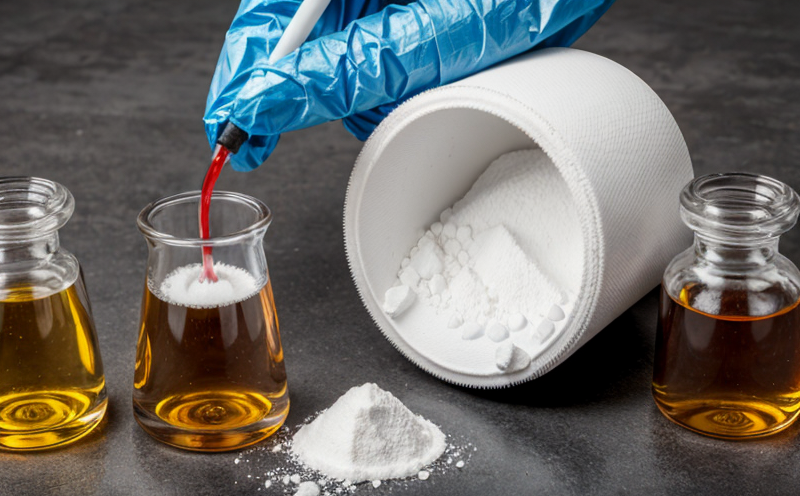DIN EN ISO 17070 Leather Chemical Substance Compliance Testing
The DIN EN ISO 17070 standard is a critical component of quality assurance and compliance in leather production. This standard provides specific requirements for the testing of chemical substances used in leather processing, ensuring that all chemicals are within safe limits set by regulatory bodies such as REACH (Registration, Evaluation, Authorisation and Restriction of Chemicals) in Europe.
Quality managers and compliance officers rely on DIN EN ISO 17070 to verify the safety and quality of chemical substances used in leather goods. This ensures that products meet international standards and are safe for consumers. For R&D engineers involved in developing new materials, this standard helps to identify potential risks early in the product lifecycle.
The testing process involves analyzing various chemical compounds present in leather tanning processes. These include formaldehyde, chromium, heavy metals like lead and cadmium, as well as a range of other additives that could pose health hazards if not properly controlled. Proper testing ensures compliance with international regulations while also enhancing the reputation of manufacturers.
At Eurolab, we specialize in providing comprehensive DIN EN ISO 17070 leather chemical substance compliance testing services. Our state-of-the-art facilities are equipped to handle complex samples and deliver accurate results consistently across all tests. By leveraging advanced analytical techniques such as GC-MS (Gas Chromatography-Mass Spectrometry), HPLC (High Performance Liquid Chromatography) and ICP-MS (Inductively Coupled Plasma Mass Spectrometry), we ensure precision in every measurement.
The testing procedure typically starts with sample preparation, which involves cutting small pieces of leather from the batch being tested. These samples are then subjected to rigorous analysis using various analytical methods designed specifically for identifying and quantifying different chemical components. Compliance is determined based on predefined thresholds outlined by DIN EN ISO 17070.
Our team of highly qualified chemists ensures that all aspects of this standard are adhered to meticulously, from sample collection through final reporting. Each test result undergoes multiple quality checks before being reported back to clients. This level of scrutiny guarantees reliable data and builds trust between industry stakeholders.
In addition to ensuring regulatory compliance, DIN EN ISO 17070 testing plays a crucial role in protecting brand reputation by demonstrating commitment to safety standards. Consumers today expect brands they purchase from to follow strict environmental practices which extend beyond mere legal requirements. By adhering closely to these guidelines, companies can build stronger relationships with their customers and maintain long-term success.
At Eurolab, we understand the importance of maintaining high levels of quality assurance throughout every stage of leather production. Our DIN EN ISO 17070 testing services are tailored specifically for those looking to ensure their products meet stringent chemical safety standards while staying ahead of evolving regulatory landscapes.
Benefits
- Ensures compliance with international regulations
- Enhances brand reputation and consumer trust
- Promotes safer manufacturing practices
- Aids in maintaining long-term industry success
- Facilitates easier export to international markets
- Reduces risk of product recalls or legal issues
- Supports continuous improvement efforts within organizations
- Provides detailed insights into chemical composition and potential risks
International Acceptance and Recognition
- DIN EN ISO 17070 is recognized globally for its robust approach to evaluating leather chemical substance compliance.
- The standard has been adopted by numerous countries, including major economic powers such as the United States, China, Japan, and several members of the European Union.
- Compliance with this standard can significantly enhance export opportunities for manufacturers operating in diverse markets.
- It serves as a benchmark against which other testing methods are often measured.
- The widespread acceptance reflects its reputation for reliability and accuracy.
- Organizations that comply may find it easier to meet additional certification requirements due to the comprehensive nature of DIN EN ISO 17070.
Eurolab Advantages
At Eurolab, we pride ourselves on offering unparalleled expertise in DIN EN ISO 17070 leather chemical substance compliance testing. Our advanced infrastructure and experienced staff ensure that every test conducted meets the highest standards of accuracy and reliability.
We offer customized solutions designed specifically to meet individual client needs, whether they are large corporations or small businesses. By partnering with us, organizations gain access to cutting-edge technology and unparalleled expertise in leather chemistry and testing protocols.
Our commitment to excellence extends beyond just meeting compliance requirements; it includes providing valuable insights that contribute to ongoing improvements within the organization's operations. Whether you're looking to enhance product quality or expand into new markets, Eurolab is your trusted partner in achieving these goals.





